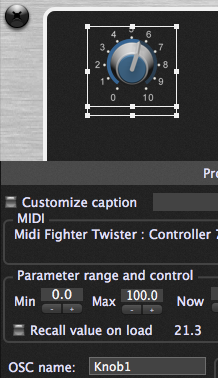

Some OSC software seems not to use the same grammar, I have to investigate. I made some progress myself by setting up a seperate little computer (NUC) dedicated to OSC. And yes, it definitely also doubles as a luring rabbit hole. The almost endless possibilities with OSC really makes a dream of mine come true. It got me started together with this thread. It's a bit confusing in the beginning but quite simple to use. Assigning the important stuf to generic controls (typically, envelopes, filters, waves etc is a start, but then you have to flip back to the screen for anything beyond those few controls, and controls aren't labelled, or even the correct type for the control (eg using a knob for an on-off switch) - it's all rather too much of a compromise for me. Brian Rivlin's video on OSC was an eye opener for me too. You have to set your Lemur the right way, sending osc on 8002 and listening on 8000. Then in the menu Modules/Script/Show script output, it monitor what ocs is going in and out and it helps a lot. In the lower part there's a checking box (print log in script output '.

This port is the port used by M8 to send OSC feedback. in between, for example switching through plugin windows and adjusting. In the right part of the window 'keyword sender', you must enter Lemur local IP and a network port, usually 8000. on the sc-users list and the OpenFrameworks forum who have spared the time to. In the left pat of the window 'keyword listener', when you get it active, it will show your local IP (M8 machine) and the used port for listening (receiving) OSC messages, usually 8002. Regarding osc global module, here's what I know and have experienced : Midi goes from 0 to 127, so 128 values, *16 channels, so 2048 different signal values.Įvery note or control change or else has a channel value e.g., 2/43 (value 43 of channel 2)


 0 kommentar(er)
0 kommentar(er)
